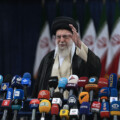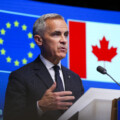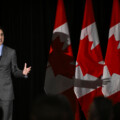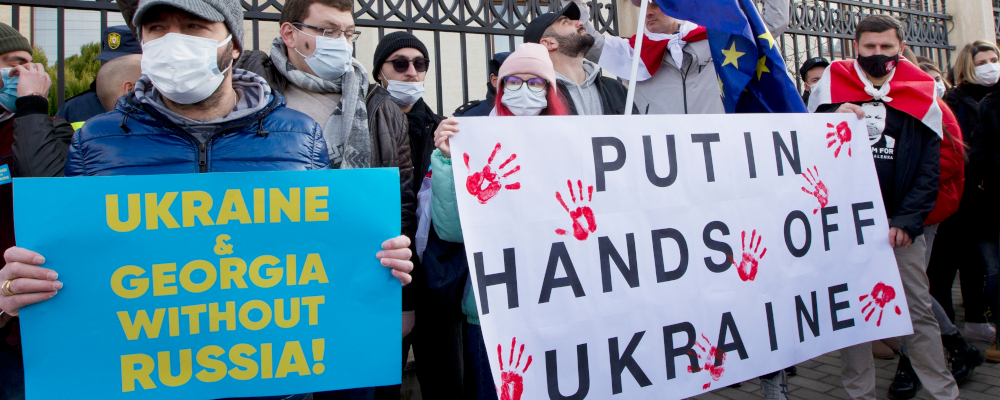Ukraine is about to become the burial ground for the western rules-based global order, NATO, and the EU. The world’s dictators are watching. Vladimir Putin is at the top of his power with Russia, Belarus, Kazakhstan, and Ukraine about to fall in his order. Iran is about to cross the threshold as a nuclear weapon state as its terrorist proxy militias carry out attacks across the Middle East with impunity. North Korea is threatening to test nuclear weapons and intercontinental ballistic missiles. Beijing is preparing to seize the South China Sea from Taipei to Manila and most of Northern India. They want to see the end of the rules-based order and the U.S. global alliance system like there is no tomorrow.
World leaders forget Russian President Vladimir Putin’s record of military intervention at their peril. Putin has fought the Second Chechen War in 1999, the Russo-Georgian War in 2008, the invasion of Ukraine and seizure of Crimea in 2014, the Syrian Civil War in 2015, and Kazakhstan in 2022. He has not flinched in the face of global condemnation, sanctions, threatened outside intervention, economic pain, casualties, use of weapons of mass destruction (as witnessed in Syria), or domestic dissent. A wider war with Ukraine is not going to force him to back down while his NATO and EU opposition appears weak, disjointed, and risk-averse. As much as he wants to destroy Ukraine as a sovereign state, he also wants to destroy the credibility of the U.S.-led world order, of NATO, and the EU. U.S. President Joe Biden’s “slip of the lip” suggestion that a limited Russian incursion into Ukraine could be ignored has only added to the uncertainty and difficulty in finding a peaceful solution to the crisis.
Signals from Washington that the U.S. has ordered the evacuation of all non-essential personnel and their families from the American embassy in Ukraine only strengthen the Kremlin view that the West won’t fight for Kiev no matter what is at stake. Minimalist efforts from the U.S., Britain, the Netherlands, and the Baltic States to send anti-tank weapons, anti-aircraft missiles, and other lethal aid to Ukraine to help in its defence are not effective unless the Ukrainian military is also trained how, where, and when to use them.
Germany seems to have refused the overflight of its territory, forcing Britain to fly its weapons shipments to Ukraine around Germany. Germany seems set on neutrality in this Ukrainian-Russian conflict at the expense of the NATO alliance, EU, and Ukraine in exchange for Russian oil and gas. Turkey has warned there will be no more drone sales to Ukraine if any more videos appear of the Ukrainians using drones to attack Russian positions in the Donbas. At the end of the day, without firing a shot Vladimir Putin has succeeded in exposing the divisions in the political stratosphere of the NATO alliance and the EU beyond his wildest dreams. A larger Russia and Ukrainian War will only exasperate these now apparent divisions.
When it comes to actual conflict, Russia has a huge overall numeric advantage over Ukraine. In terms of manpower, Russia has Ukraine 4:1, in fighter planes 22:1, in attack helicopters 15:1, in main battle tanks 5:1, in armoured vehicles 2.5:1, and in artillery 2.4:1. When Russia’s precision strike capabilities and air defence forces are brought to bear, Ukraine stands little chance against an invasion force.
This is especially true if Russia moves off-road and stays out of street fighting in major Ukrainian cities. Russia has deployed precision strike missiles that could strike any Ukrainian location from inside Russian territory or the Black Sea. Weapons like the SS-26 short-range ballistic missile system, with a range of 250 to 350 kilometers, are currently deployed near Ukraine. Russia can also strike Ukraine with systems like the 500 kilometre -ranged SSC-7 ground-launched cruise missile, the 1500 kilometre-range naval SS-N-30A Kalibr land-attack cruise missile, or the strategic bomber-launched Kh-555 or Kh-101 cruise missile with ranges estimated at 2,000 to 4,000 kilometres.
More than 130,000 troops, or 60 plus self-contained Battalion Tactical Groups (BTGs), have been deployed around Ukraine, from Russia’s Western Military District to the Eastern Military District and the border with North Korea. Russian reserve units have been called up across the country. Now rail has deployed as many as 100-140 BTGs to Belarus to deter NATO and help with the invasion of Ukraine by threatening Kiev directly. These are ostensibly for “exercises”, yet dwarf the massive Russian presence for last year’s Zapad exercise. If Russian airborne units now returned from Kazakhstan are committed from the Western Military District it would add another 30,000 troops to the Russian order of battle. We have seen pictures of large numbers of T-72s fitted with external fuel barrels, snorkels, and mine plows, meaning they are not stopping for any obstacle and are going off-road. Russian Su-35S fighter planes have been deployed to Belarus, along with S-400 and Pantsir air defense systems. Russia has forward deployed several squadrons of Su-35S fighter planes to the Western Military District opposite Ukraine, meaning air superiority for Russia is a given fact.
When it comes to actual conflict, Russia has a huge overall numeric advantage over Ukraine.
Russian military options include a decapitation strike on the Ukrainian leadership to replace it with a pro-Russian government in exile in Moscow; formalizing the seizure of the Donbas; the seizure of Ukraine’s southern coast up to Transnistria along with Mariupol and Odesa and the city of Kharkiv in the east; the seizure of Ukraine up to the Dnieper and leaving it to whither as a failed state; or an all-out offensive to capture the country.
Russia is now in the process of deploying some 250-350,000 troops, nearly surrounding Ukraine from the north, west, and to the south. The UK Foreign Office has warned that Russian intelligence is also collaborating with several former Ukrainian officials who fled to Moscow in winter 2014 and are looking to return to positions of power in Kiev after a Russian invasion. Other reports suggest Moscow is drawing up a list of people that they could turn to in Ukraine’s intelligence and security services to help run the country after the Russian occupation.
As part of its efforts to deter NATO from coming to Ukraine’s defence, it can be expected that Russia will carry out war games with its Strategic Rocket Forces, Air Force, and Navy. True to style, six large Russian amphibious ships of the Northern and Baltic fleets are transiting south for likely amphibious operations in the Black Sea. Russia is holding snap naval drills around the country including a newly scheduled live-fire drill in the Irish Sea. Nation-wide coast-to-coast naval exercises will involve more than 140 warships, 1,000 pieces of military equipment, 10,000 troops, and some 60 aircraft. The Russians view the area of ocean southwest of Ireland as a key naval access point and carry out exercises here geared towards defeating North America-based NATO reinforcements attempting to come to the aid of embattled NATO forces in Europe.
The U.S. approach right now relies on naval forces to deter Moscow and Beijing. The U.S., for its part, has deployed its aircraft carrier battle groups to match and deter Russian naval forces, with the USS Harry Truman deploying to the Mediterranean Sea. The USS Carl Vinson and two amphibious assault ships, the USS Essex and USS America, along with Japan’s aircraft carrier JS Hyagu, have been deployed to the Philippine Sea to deter China from acting out in the Pacific under the cover of a Russian invasion of Ukraine. Sunday saw Beijing send 39 warplanes on an incursion of Taiwan’s air defense zone. The USS Ronald Reagan and USS Abraham Lincoln carrier strike groups are in and around Japan. But more powerful U.S. naval forces need to be forward deployed to European waters if they are to have any impact on Vladimir Putin’s game plan.
At the end of the day, Putin is prepared to score the east of Europe and Ukraine at the expense of the U.S., NATO, and the EU. We are at the stage where only western military pushback all across the line makes a difference in the Russian equation of victory. It’s time that the NATO alliance found itself and pushed back hard on Russia in Ukraine before it is too late. The time has come for NATO to deploy its strategic airborne and special forces (along with supporting airpower, including squadrons of A-10 tank busters) to Ukraine to warn off its Russian opponent, or surrender the western world-based order to Russia and the dictators. The decision is ours. We stand on the precipice.
Recommended for You

The Notebook by Theo Argitis: Mark Carney’s first major tests

Michael Bonner: Are we witnessing the last gasp of Iran’s Islamic Republic?

Need to Know: Yahoo, Alberta! You’re doing something right

‘He’s a master of globalization in a re-nationalizing world’: Michael Ignatieff on the domestic and geopolitical challenges facing Prime Minister Carney



